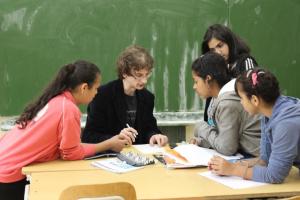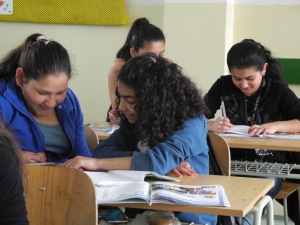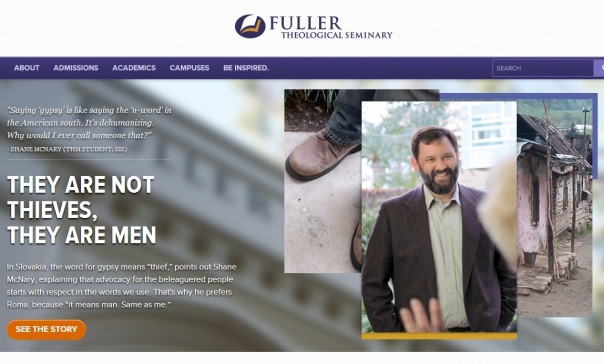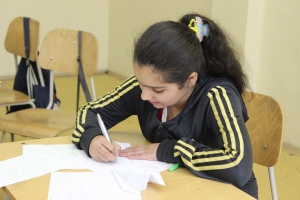A few weeks ago our friend Pavol Ičo, the English teacher at the Roma high school here in Kosice, had this article published in the
Slovak National Newspaper, the oldest newspaper in the country (
their website is here). He writes about the importance of the work they are doing there, and why education among the Roma here in Slovakia is such a difficult but vital task. With his permission, I
posted a translation of that article on our blog, and am reposting that article here. We are proud of Pavol (who is Slovak) for publicly tackling such a difficult racial issue among his countrymen!
Please remain in prayer for this school - it has been almost completely defunded, and its future is uncertain.
(The footnotes are ours, provided for clarification.)
--------------------------------------

- Pavol Ičo (center) teaches at the Roma Gymnazium in Kosice.
A Unique School
About 70 students study at the Roma private gymnazium (1) at #9 Galakticka Street in Kosice. That’s not many, compared to the average Slovak gymnazium; but on the other hand, keeping in mind the fact that more than 85 percent of Roma children study in “special schools,” (2) then each gymnazium-level Roma student – and especially graduates – are actually very rare.
Our efforts, as teachers in the above-mentioned gymnazium, are particularly aimed at giving the students as much direct knowledge as possible during the learning process at the school. The results of these efforts are demonstrated by the fact that, during its ten years of existence, the school has graduated nearly 70 students. Only a small number of Roma are able to handle all the requirements demanded of gymnazium graduates, which is understandable when you consider the type of environment these students come from. (3)
Study in the gymnazium is especially difficult for Roma girls. They often become mothers at an early age, and therefore have little interest in education.
So how have we managed to bring such a relatively high number of Roma to graduation?

Certainly it is mainly a question of providing access. The Roma student indeed sees the teacher first as a person, and so it seems effective to approach the Roma pupils in view of the theory of humanistic education, that views education (and the entire learning process) as a coming-together of two personalities. And particularly these Roma pupils, who in everyday life struggle with a lack of attention from their parents, with poverty, with hunger and often also with physical punishment and sexual abuse – these students deserve respect and attention from the teachers, if only because they have interest in education and because, in place of criminal activities, they have chosen a more difficult path: the path of learning. But even considering this fact, in our gymnazium pupils are not graded more leniently than elsewhere. And our school’s educational program, as well as the thematic lesson plans, are based on the state’s educational curriculum.
However, we approach individual topics with our students using fun methods: knowledge competitions, for example, which do not require a word-for-word reproduction of knowledge and concepts, but focus instead on the overall comprehension and understanding of the given issue.
Despite the fact that most of our graduates have been accepted to universities at home and abroad, the state barely gives us any financial support.
They say there is no need for Roma gymnaziums. They say that talented Roma students can study in standard gymnaziums. But which “white” parent would sit their child beside a Roma classmate? And which Roma would be able to endure the bothersome teasing of his much wealthier classmates?
For now, therefore, Roma need their own schools. Schools in which they will not be seen as second-class citizens, schools in which they can see that that an interest in learning can produce more than just screaming from white teachers.
The path to improving the education level of Roma will undoubtedly be challenging, but the very existence of three Roma gymnaziums in Slovakia is proof that this path is not impossible.
--------------------------------------
(1) The Slovak word "gymnazium" doesn't really have an equivalent in English. It's a form of secondary education that focuses students toward university study, rather than vocational or trade study. Gymnazium study can last up to eight years, and would occur when U.S. students are going to middle- and high-schools. Not all students study in gymnazium - some spend those years in a professional schools or vocational/trade schools.
(2) "Special schools" - Roma are often placed into schools for those considered mentally disabled.
(3) Most of the students at this school live in the infamous Lunik IX ghetto in Kosice.
 Some things haven't changed much since Wenceslas (really a duke) went about doing good deeds (907–935). In many places, poor people still gather winter fuel wherever they can find it, legally or illegally.
Some things haven't changed much since Wenceslas (really a duke) went about doing good deeds (907–935). In many places, poor people still gather winter fuel wherever they can find it, legally or illegally. 
 And remember, too, people like Pastor Petru Ciochina, pictured here with a composite log made from scrap materials. He is looking for new ways for him and his people to gather winter fuel.
And remember, too, people like Pastor Petru Ciochina, pictured here with a composite log made from scrap materials. He is looking for new ways for him and his people to gather winter fuel.


















